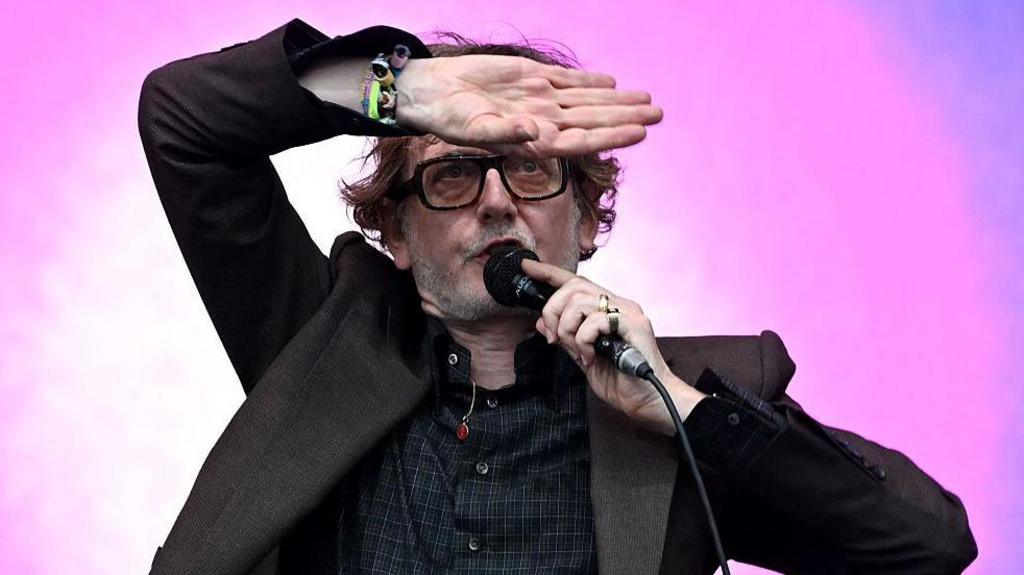“`html
Glastonbury’s worst-kept secret was confirmed as Pulp took to the stage, billed under the pseudonym “Patchwork.” The confirmation, however anticipated, still generated palpable excitement.
“If Robbie Williams comes out? I’m leaving,” a festival-goer remarked as the stage began to fill with a seemingly random assortment of people – common people – clad in plastic raincoats.
Then, to a hero’s welcome, Jarvis Cocker emerged onto the Pyramid Stage, immediately launching into “Sorted for E’s & Wizz,” a defining track from Pulp’s seminal 1995 album, Different Class.
“Sorry to the people who were expecting Patchwork,” Cocker quipped after the song concluded. “Did you know it was us?”
The crowd responded with a resounding “yes,” accompanied by a palpable sense of collective amusement.
“But how?” Cocker deadpanned, acknowledging the poorly kept secret.
In the lead-up to the festival, the Sheffield band had made attempts, however feeble, to conceal their identity.
Cocker had previously stated they would only attend if it was a “life or death situation,” while keyboardist Candida Doyle told BBC 6 Music that festival organizers were “weren’t interested” in booking them.
The statements proved to be an elaborate deception, setting the stage for their surprise appearance.
This year marks the 30th anniversary of Pulp’s historic 1995 headline set on the Pyramid Stage, coinciding with a significant resurgence in their popularity, marked by a new album titled “More!” topping the charts.
With Glastonbury taking a fallow year in 2026, the timing for a return seemed opportune.
Their set featured a mix of new material, including the upbeat “Spike Island” and the gospel-infused “Got To Have Love,” but the audience was primarily there for the classics: “Babies,” “Misfits,” and, of course, “Common People.”
Cocker, with his signature energetic stage presence, moved across the stage, his arms punctuating the air.
During “Acrylic Afternoons,” an ode to suburban life, he tossed tea bags to fans at the front of the stage, showcasing his enduring idiosyncrasies.
His unique stage presence remains captivating.
Among the enthusiastic crowd were Glastonbury organizer Emily Eavis, Sunday night headliner Olivia Rodrigo, and former Radio 2 DJ Zoe Ball, who described the experience as “total euphoric recall.”
“Hearing all those songs again, with my old mates, jumping up and down… I love being here with all these people who love them as well,” Ball commented.
“It was a real high.”
Pulp’s 1995 headline performance has become a legendary moment in Glastonbury history, secured after Stone Roses guitarist John Squire’s injury necessitated a last-minute replacement.
Cocker later admitted, “it was the most nervous I’ve ever been in my life.”
He recounted to Vox magazine, “But then Robbie from Take That came and wished us luck.”
“Robbie read us some of his poetry. I was dubious at first, because sometimes poetry can be embarrassing, but it was really good.”
The performance took place shortly after the release of “Common People,” which would soon become their signature song.
With the anthem climbing to number two in the charts, the band strategically positioned it as the set’s grand finale for maximum impact.
Introducing the track, Cocker delivered a heartfelt speech reflecting on the band’s journey.
“If you want something to happen enough, then it actually will happen – and I believe that,” he declared.
“In fact, that’s why we’re stood on this stage today after 15 years, because we wanted it to happen, do you know what I mean?
“So if a lanky git like me can do it, you can do it too.”
The band then launched into a celebratory and communal rendition of “Common People,” solidifying Pulp’s place as Britpop icons.
“That was the event that made the success a concrete fact,” Cocker later reflected on Radio 4’s Desert Island Discs.
Pulp went on to achieve significant commercial success, selling over 10 million records before entering a decade-long hiatus in 2001.
They toured sporadically in the years that followed, but only committed to creating new music last year, reportedly after receiving “an offer we weren’t sure we could refuse.”
On stage at Glastonbury, Cocker described the band’s decision-making process, which occurred in a “living room in the north of England.”
“We had one poor quality acoustic guitar, and out of tune piano and an African drum, and we attempted to play this song and at the end of it we somehow decided to tour.”
That song was “Something Changed,” possibly the band’s most romantic ballad, played on the same instruments in a circle at the center of the Pyramid Stage.
Like the rest of the set, it served as a sentimental gesture, steeped in nostalgia.
The set concluded, appropriately, with “Common People,” enhanced by a Red Arrows flypast at the song’s climax. The timing of the aerial display clarified why Cocker had spent much of the set checking his watch.
As he departed the stage, Cocker thanked the audience and promised, “I’ll see you at Arcadia later, alright?”
It’s a date.
Only a handful of K-pop artists have come out as gay, but none as publicly as Bain. Is this a turning point?
Brian Johnson helped to build the first ever Pyramid Stage in 1971.
An artist staples 3,000 hats into a Gallagher brothers mural ahead their Cardiff gig.
An artist says his hands are in pain after creating a portrait of the Gallagher brothers using 3,000 bucket hats.
The UK’s biggest festival kicks off this week. Here’s who’s playing, and a guide to the secret sets.
“`

